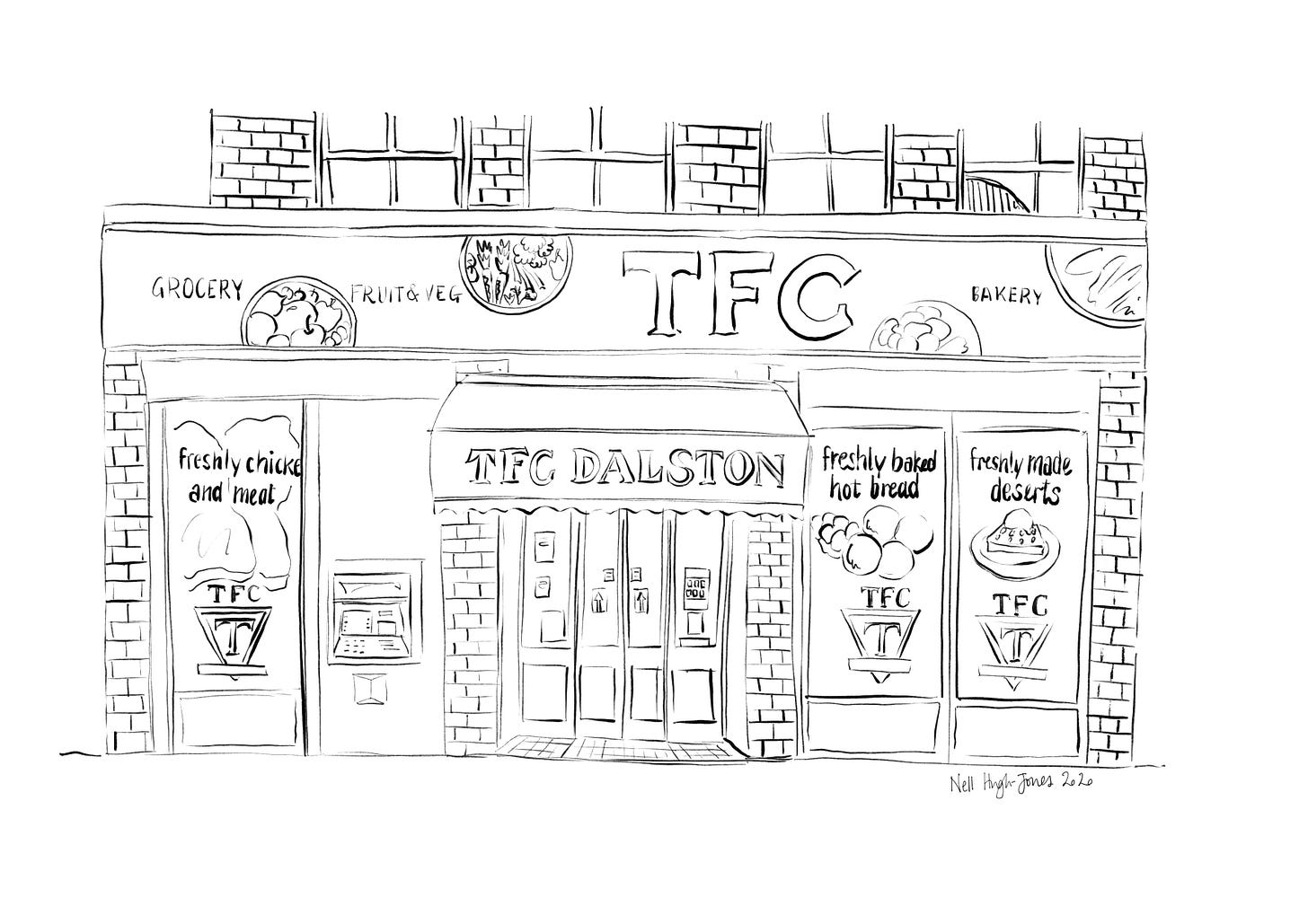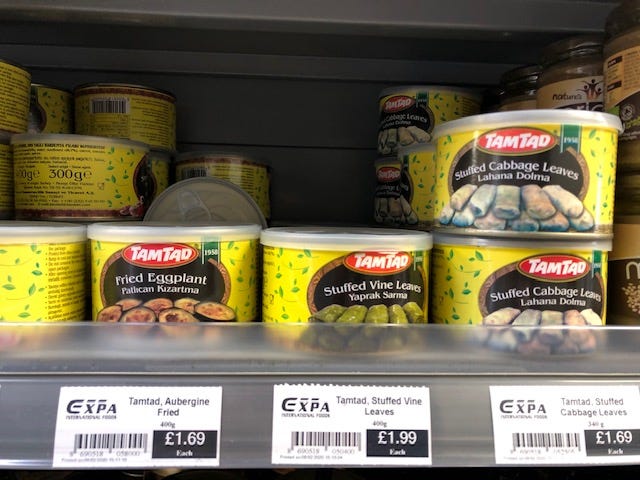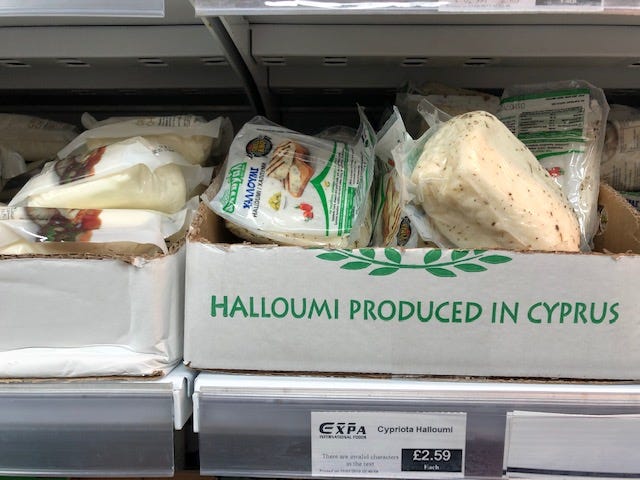Vittles 3.1
Turkish Supermarkets: Treasure Troves in the Age of Corona
Some of my first food memories tethered geographically to a specific place were childhood trips to a shop called Yasar Halim. I grew up in Stoke Newington but my mum would still make the trip to Green Lanes every week, eschewing the Stamford Hill Safeways and Netto (real ones remember). I mainly recall being left to my own devices during these trips, so I was able to make exploratory excursions down aisles my mum had no interest in: the meat counter which would be butchering unidentifiable cuts and organs, the thick sausages that seemed to be wrapped in some kind of tight red latex, as bulging and lurid as a Tom of Finland cartoon. The area we both had interest in was the bakery section next door: boreks with layers like crispy cellophane, stuffed with feta and spinach, or spiced minced meat if I was lucky, impossibly large cakes, or pizzas which didn’t really resemble or taste like any pizza I had come across before (if someone starts doing these properly they could be London’s own version of square slice). Because of the feta and cheese, I (and I think even my mum) always called it the Greek shop, but it wasn’t until years later that I realised Yasar Halim didn’t sound Greek at all, and lo and behold, it turns out that it was Turkish Cypriot all along (for those who know the shop well, Yasar, the founder, unfortunately died earlier this year).
Anyway I mention all of this not just because it shows how interconnected the foodways of Greece, Cyprus and Turkey are, but also because these shops are not just used by certain communities - they eventually become indispensable to everyone. My mum is from Goa via Kenya, yet she would be able to get much of what she needed in Yasar Halim and would travel to do so, impressed by its quality and cheapness. When we moved to Palmers Green, incredibly there was yet another, bigger Yasar Halim, and when TFC opened on the North Circular it became unnervingly easy to walk and get hold of those boreks again.
Today’s vittles is an ode to Turkish supermarkets by Panayiota Soutis. Panyiota was, up until recently, the manager at Clipstone - a restaurant I’m sure many of you already know and love. Although she is of Greek and Cypriot heritage, it is a Turkish supermarket that reminds her of home, or at least a home she never grew up in (“My blood being one thing” she says “my reality, my birthplace, another”). Panayiota has chosen to write about the daddy of the Turkish supermarkets, TFC, and how it not only provides an absolutely vital service, but also a connection to her identity as a second generation immigrant. To those unfamiliar with them she says “don’t be daunted by unknown products, but embrace the journey of discovery. Grocery shopping - one of the few activities we can freely participate in - should be easy and fun. Most of all, fun”.
This is Panayiota’s first piece for Vittles and also her first piece of non self-published food writing.
To find your nearest TFC or other Turkish supermarket, please check out this map I’ve made to accompany this piece https://drive.google.com/open?id=1KHLFMvh9QjWm0wNc4IelciJonPI9usgu&usp=sharing
Treasure Troves in the Age of Corona
Hackney brims with Turkish stores. During this rather bleak time, when the world is becoming an ever-scarier place, these shops offer a journey of discovery for some, while for others they are already bedrocks of the community: from the humble cornershop through to the mecca of them all, TFC, the Turkish Food Centre.
I have a small ceremony whenever I step inside TFC. I walk towards the butcher, busy breaking down a cow destined for the mangal. I shuffle past the vats of floating feta and olives swimming in brine and ogle at the baked goods, dreaming of a large enough tea party to justify buying every single sugar-coated cookie. Sometimes I contemplate just how many boreks I could eat in one sitting. I slide towards the pickle jars, from the small fridge-friendly pots to the ginormous vessels fit to feed a whole neighbourhood. Then, to the aisle stuffed with innumerable cheeses and dips, and from there to the tinned goods, crammed not just with Heinz but with fish and dolma. After a while, it’s possible to lose yourself and all sense of time.
Turkish stores have sustained my existence ever since I moved to east London four years ago, from my first dump of a flat in Dalston to my current home in Homerton. In our current age of stockpiling, these shops are a gold mine, whether it’s to find fresh produce that is vanishing from supermarket shelves, or long-life goods you never knew you needed in your life.
The first TFC I ever visited was the one on Ridley Road Market, when I had just moved to Dalston. My dad is Greek and my mum is Greek-Cypriot: I often feel homesick, nostalgic for a place I’ve never really known myself. But, wandering down the aisles of a Turkish supermarket in the middle of Hackney, I felt at home. Here were all the fruit and vegetables I’d only ever sampled on holiday in Greece and Cyprus! All the jarred and tinned goods I’d eaten in my auntie’s houses throughout my childhood, resurrected in front of my very eyes. All the halloumi I could ever wish for! Endless rows of neatly rolled stuffed vine leaves, that even my mother can’t replicate. By the time I got to the bakery section, I had lost all sense of composure, eyes wide with delight upon finding the baked goods I crave every time the plane touches down in the sweltering heat of the Mediterranean: rings of sesame bread (simit in Turkish, koulouri in Greek) stacked high; perfect piles of emerald encrusted baklava; kadayif, samali, shiny filo pastry coated in syrup, dripping with tahini; pastries plump with the sugary, salty stuffings only dreams are made of. All of this on my doorstep.
Mapping it out, if you live in Hackney, there’s a hierarchy. In Homerton and Clapton the Turkish shops are more like mini markets, basically corner shops with more options than usual. On Stoke Newington High Street, you’ll find larger stores, with a butcher at the back, serve-yourself olive bars, extensive bakery sections and an exhaustive range of fruit and vegetables. The TFC on Ridley Road is like the whole ecosystem in one place. And it doesn’t just stop at Mediterranean produce: it stretches all the way to Iran and back to Eastern Europe, Bulgaria, Poland and Romania. There are plenty more treasure troves, all over east London, from Green Lanes up to Edmonton, around the rest of London and the UK.
Although there has been and still is animosity, Greece, Cyprus and Turkey are forever connected by their deep-rooted culinary history. On the shelves of Turkish supermarkets I learn about my culture and heritage through food, experiencing a life my family lived, previously only encountered in stories told over a shared meal. The beauty, as well as the tension, of diaspora and historic immigration patterns are most easily understood through cuisine.
In today’s situation where restaurants are closed, our local shops, stocking produce from all around the world, assume the educational, exploratory role that restaurants once held, relocating it to the domestic sphere. These shops give us the opportunity to taste new flavours, to travel far and wide, when the only place we can go is our own home.
Plus, you’ll probably find loo roll in abundance.
A Mediterranean Spread
(All products available at TFC, or similar)
This is best served at room temperature, ideally the next day, allowing the flavours of the tomato sauce to intensify. If you hate okra, use green beans instead and skip the first step of the method.
1kg okra
120ml vinegar
60ml olive oil
2 garlic cloves, finely chopped
1 white onion, finely chopped
1 tin of peeled plum tomatoes
2 tbsp tomato paste
2 tsp sugar
1 bay leaf
Clean, wash and drain the okra. Drizzle with the vinegar and spread them out on a towel to dry. Ideally let the okra dry in the sun, if you can find any.
Heat the oil in a saucepan and saute the finely chopped onion and garlic.
Add the tomatoes, tomato paste, sugar and bay leaf, season with salt and pepper and leave to simmer.
In the meantime, heat some oil in a frying pan and gently fry the okra. When lightly brown, transfer the okra into your tomato sauce.
Add a few splashes of water and allow your mixture to simmer until the sauce thickens nicely with a deep flavour.
On the table, accompanying your okra, should be some luscious black olives, a bowl of stuffed vine leaves, several slices of just-fried halloumi (always fry in ample olive oil) or, if you prefer, a block of feta sprinkled with oregano, toasted pitta bread or sliced sesame loaf, and a range of dips: tahini, tzatziki or muhammara, whichever takes your fancy. You can make any of them yourself, but they are readily available at your favourite local Turkish store, so why make life any harder.
Panayiota Soutis was the manager of Clipstone in Fitzrovia up until last week. She also writes in her spare time on her blog Pan’s Palette https://www.panspalette.com/ . Panayiota was paid for this piece.
The illustration for this piece was done by Helen (Nell) Hugh-Jones whose work you can find on her website https://nellsoriginals.wordpress.com/ . Helen was also paid for her illustration.
Please subscribe on Substack if you enjoyed this piece, and do consider supporting on Patreon https://www.patreon.com/user?u=32064286





